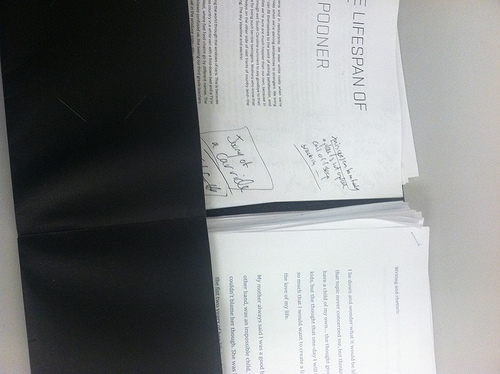
Teaching & Grad School
[flickr id=”8230425760″ thumbnail=”medium” overlay=”true” size=”original” group=”” align=”none”]
Teaching is an important part of graduate school. I know there are some people who don’t want to teach, and that’s cool, but for those of you who want to, this is the time.
We’re lucky in my program: we all get the opportunity to train to become a teacher. At some schools, you have to be selected. When I was at Western Washington University and New Mexico State University, teachers were picked at the time of acceptance. My first year at WWU, I was not picked, but I snagged a TA position with the Theater Department’s Intro to Cinema. I got to work beside Professor (and good friend—he’s the guy who married my wife and I) Patrick Dizney. That was a 300 student class. I was terrified, but I learned quickly how to project and how to improvise. I also got to talk about film for 4 hours every couple days and show films I thought the students should watch.
My second year, I was able to land an assistantship teaching Introduction to Native Indian Literature with John Purdy. This guy didn’t have notes, didn’t play. He just knew that we were going to talk about a book or film or poem or essay or something. We’d meet before class and he’d say, “Let’s talk about this.” So we’d talk. Then on some days, he’d say, “You’re teaching today.” Some days in the middle of a lecture, he’d turn and say, “What do you think?” I’d be like, “uh, uh, yeah, so…” A crash course in thinking on my feet.
Purdy talked a lot about the classroom being where the learning happens—not because of planning or lectures, but because there are moments that cannot be repeated, questions students have that may not come up again, or things that the teacher thinks of that can’t happen in a class that’s too planned. I learned quickly to KNOW the material and just go with what happens. He said, “Letting a class go off topic is how they learn. You’re job is to try to bring in back to the class. Even if you fail, they’re talking, they’re learning, they’re participating, and also, they’re engaging with the work.” So, when I went to NMSU, picked to teach Rhetoric and Composition, with less than 20 students, I was beyond ready. It was the teaching of composition that took a bit of adjustment.
[flickr id=”8230424216″ thumbnail=”medium_640″ overlay=”true” size=”original” group=”” align=”none”]
Here, there’s a big arts focus (obviously), so my locker is filled with books of writing, art, and random things. Teaching through the art-school lens has made me a better teacher, writer, and thinker. Not only does my teaching constantly evolve, but I only solidify that fact that I HAVE to teach for a living.
If you are someone who goes, “I want to be a teacher.” Then graduate school is that opportunity, and as Poetry MFAer, you’re lucky enough to get that option. But it’s not a free ride; you gotta work hard. Teaching isn’t about coasting, It’s about challenges. Teaching is never easy, but it’s always good (even when your students are pissing you off). I love teaching and don’t see myself not doing it. Period.
